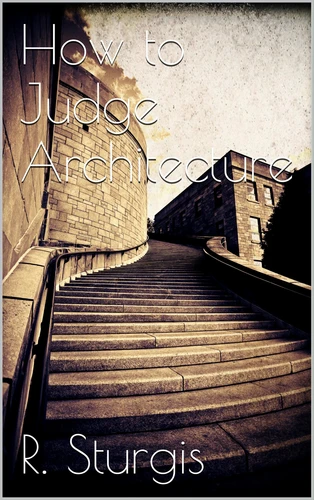How to judge architecture
Par :Formats :
Disponible dans votre compte client Decitre ou Furet du Nord dès validation de votre commande. Le format ePub est :
- Compatible avec une lecture sur My Vivlio (smartphone, tablette, ordinateur)
- Compatible avec une lecture sur liseuses Vivlio
- Pour les liseuses autres que Vivlio, vous devez utiliser le logiciel Adobe Digital Edition. Non compatible avec la lecture sur les liseuses Kindle, Remarkable et Sony
 , qui est-ce ?
, qui est-ce ?Notre partenaire de plateforme de lecture numérique où vous retrouverez l'ensemble de vos ebooks gratuitement
Pour en savoir plus sur nos ebooks, consultez notre aide en ligne ici
- Nombre de pages148
- FormatePub
- ISBN978-3-7481-4942-2
- EAN9783748149422
- Date de parution26/10/2018
- Protection num.Digital Watermarking
- Taille4 Mo
- Infos supplémentairesepub
- ÉditeurBooks on Demand
Résumé
In trying to train the mind to judge of works of architecture, one can never be too patient. It is very easy to hinder one's growth in knowledge by being too ready to decide. The student of art who is much under the influence of one teacher, one writer, or one body of fellow-students, is hampered by that influence just so far as it is exclusive. And most teachers, most writers, most groups or classes of students are exclusive, admiring one set of principles or the practice of one epoch, to the partial exclusion of others.
The reader must feel assured that there are no authorities at all in the matter of architectural appreciation: and that the only opinions, or impressions, or comparative appreciations that are worth anything to him are those which he will form gradually for himself.
He will form them slowly, if he be wise: indeed, if he have the gift of artistic appreciation at all, he will soon learn to form them slowly. He will, moreover, hold them lightly even when formed; remembering that in a subject on which opinions differ so very widely at any one time, and have differed so much more widely if one epoch be compared with another, there can be no such thing as a final judgment.
He will form them slowly, if he be wise: indeed, if he have the gift of artistic appreciation at all, he will soon learn to form them slowly. He will, moreover, hold them lightly even when formed; remembering that in a subject on which opinions differ so very widely at any one time, and have differed so much more widely if one epoch be compared with another, there can be no such thing as a final judgment.
In trying to train the mind to judge of works of architecture, one can never be too patient. It is very easy to hinder one's growth in knowledge by being too ready to decide. The student of art who is much under the influence of one teacher, one writer, or one body of fellow-students, is hampered by that influence just so far as it is exclusive. And most teachers, most writers, most groups or classes of students are exclusive, admiring one set of principles or the practice of one epoch, to the partial exclusion of others.
The reader must feel assured that there are no authorities at all in the matter of architectural appreciation: and that the only opinions, or impressions, or comparative appreciations that are worth anything to him are those which he will form gradually for himself.
He will form them slowly, if he be wise: indeed, if he have the gift of artistic appreciation at all, he will soon learn to form them slowly. He will, moreover, hold them lightly even when formed; remembering that in a subject on which opinions differ so very widely at any one time, and have differed so much more widely if one epoch be compared with another, there can be no such thing as a final judgment.
He will form them slowly, if he be wise: indeed, if he have the gift of artistic appreciation at all, he will soon learn to form them slowly. He will, moreover, hold them lightly even when formed; remembering that in a subject on which opinions differ so very widely at any one time, and have differed so much more widely if one epoch be compared with another, there can be no such thing as a final judgment.



